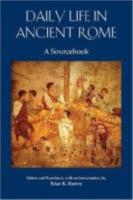
Hackett (2016) p/b 346pp £20.99 (ISBN 9781585107957)
It must be inordinately difficult to put together a sourcebook to meet the needs and expectations of such a potentially wide range of readers, from the knowledgeable to the curious. For that reason this reviewer relied on what serendipity might present—and that was a pleasing and enlightening experience.
H. introduces each selection with a brief and clear explanation of what follows so that anyone, including the non-specialist, would get what is going on. The topics covered are wide-ranging and plentiful, and, though the usual suspects are there, many of the areas covered are less well-trodden in books of this nature. So alongside ‘Children’, ‘Women’, ‘Slaves’, ‘Housing’ there appear ‘Grain Supply’, ‘Virtue and Vices: social versus legal constraints’, water supply, sewers, the rustic labour force and inns. The range of authors quoted is wider than usual, as is H.’s use of epigraphic evidence.
So under the general heading ‘Virtue and Vice’ we have material from Dio, Valerius Maximus and Justinian. The last-named’s observation on severitas is pleasing: ‘A judge should not strive for a reputation for severitas or clementia … in cases that are more trivial, a judge should tend toward leniency’. The barmaid from the 4th century poem Copa sells her bar by the very modern (neuro-linguistic programming) technique of getting the punter to envision the experience (not the features): ‘What good is it for a weary man to be off somewhere in the hot dust rather than reclining here on the drinking couch?’ … ‘…drinking cups, roses, flutes [sic], guitars and a cool terrace … your ever refilled cups … (and) … a kiss from the pretty lips of a youthful girl.’ I’m sold.
Elsewhere Elder Pliny advises on the use of worms cut from the head of a hairy spider for purposes of female contraception, Suetonius quotes Claudius’ offer of free insurance for those prepared to ship wheat in winter, and an inscription of Trajan’s reign relates that he ‘…ordered the renovation of the ditch which is designed to prevent the flooding that plagues the city of Ostia all year round.’ Nothing is too basic for the emperor’s attention. Nor for the purposes of eulogising a lost parent (3rd C AD inscription): ‘most loyal and deserving father, who also sold chickens’. Here are well chosen pieces, with brief, clear introductions, beautifully translated. A model sourcebook.
Available from all good booksellers, or direct from Gazelle: [email protected].
Adrian Spooner
